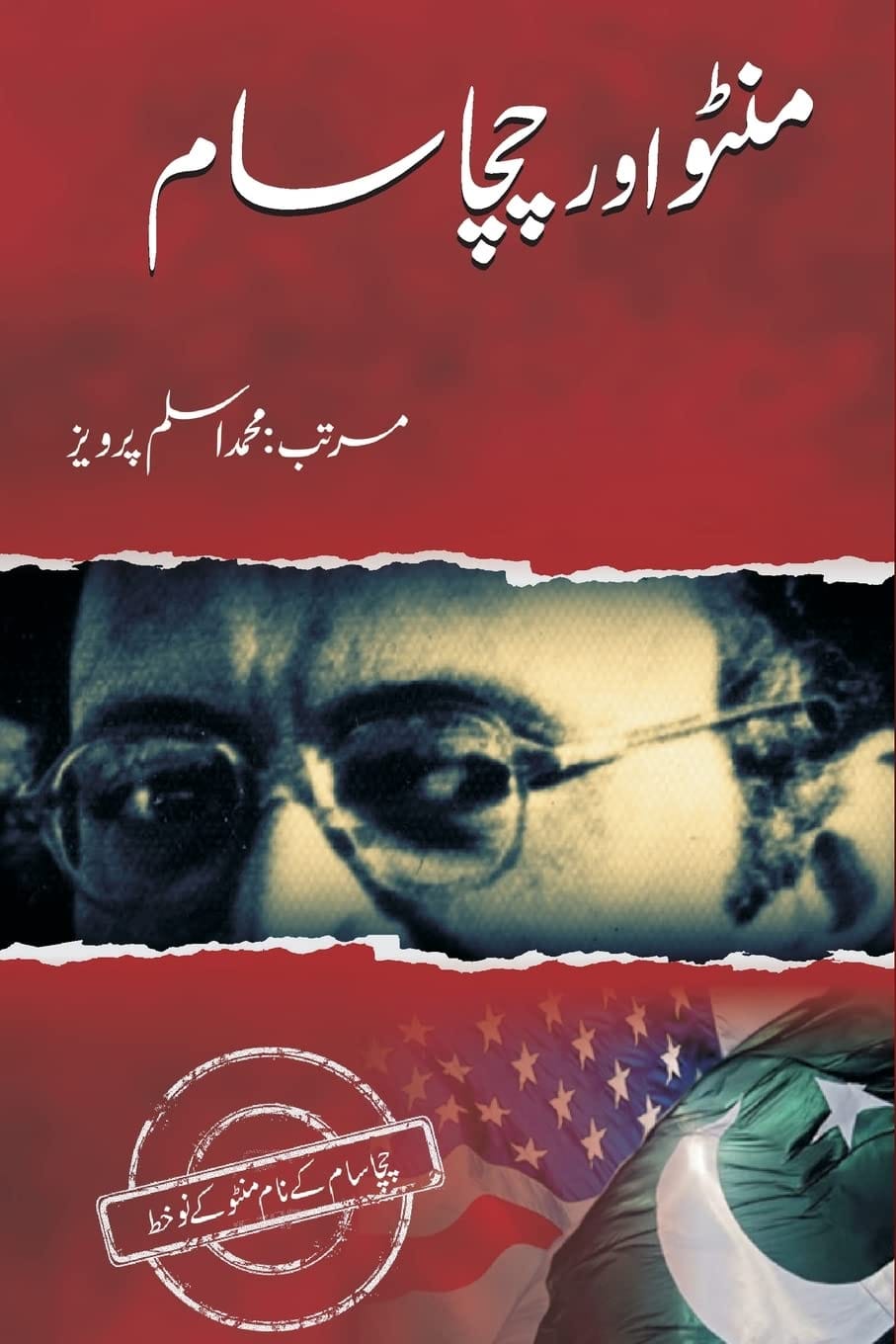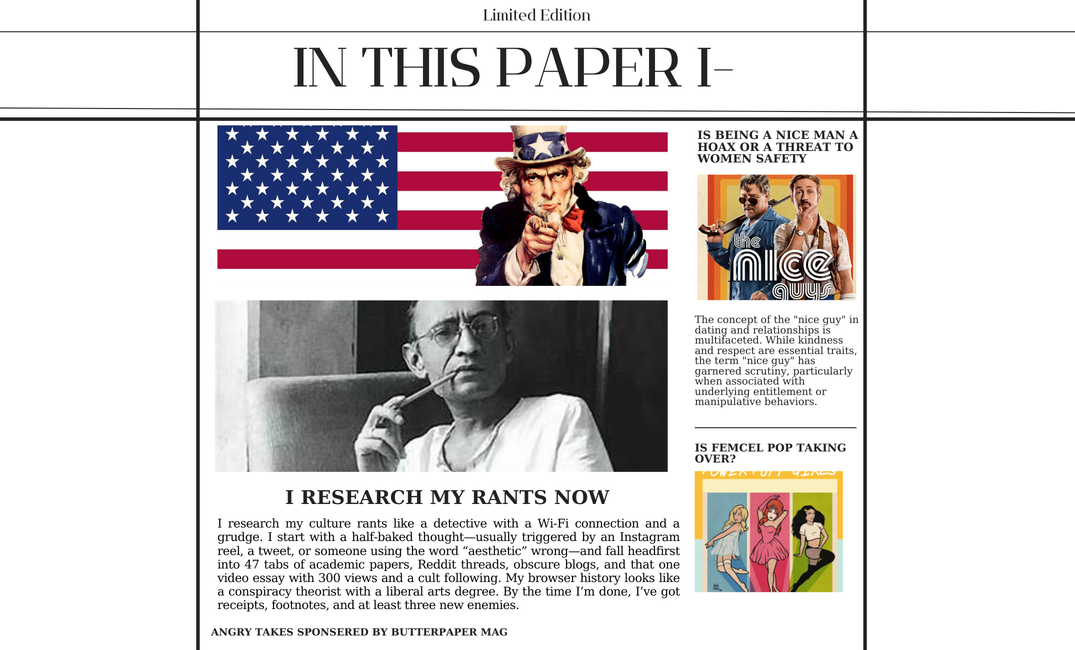Once upon a time, a young girl, writing her first book in her early 20s, read all that there was to read about and by Sadat Hasan Manto. After finding his letters written around the time of independence, she wrote:
“Sadat Hasan Manto, post-independence wrote a few letters to the national personification of the American government, ‘Uncle Sam’ These letters except for having a tasteful humorous quality also denoted a shift of South Asian countries' involuntary cultural whitewash under the hands of British Rule to its rising curiosity and obsession with the capitalist dream of America. After conducting some soul-searching with historical facts, there is another character in this letter who goes by the name Chacha Manu, denoting the Brahminical control that is partly responsible for our country's overall lack of self-worth.”
This article was originally written in 2016, at the peak of my Urdu obsession, which came hand in hand with my declarative opinions on politics, gender, caste, and race.
It’s 2025. I’m nearly 30. I’ve let go of most of the political activism that once defined me. I never wanted to be anything more than an Urdu poet. Now I’m everything except that, and maybe that’s why I’m writing this. Mostly driven by curiosity, I want to know what happens if I revisit these ideas with more life lived and less theory absorbed? What shifts, now that I’ve traded certainty for survival? This isn’t about fixing the world. I’m not sure I believe that’s possible anymore. But maybe, just maybe, I can still have fun with my past. Welcome to my experiment.

Even though I understand the leftist echo chamber I was coming from the only thing I will change in the beginning of the letter is give a little more character to Chacha Manu. I believe what he was hasn't changed but adding to my initial imagery: This character, One who, like Uncle Sam, is less a person and more a persona. ‘Chacha (Uncle) Manu’ is not a distant relative, but a familiar one. You’ll recognize him. He’s the staunch Brahminical uncle at weddings, at WhatsApp University, and often, in parliament. If Uncle Sam represents the external force of white capitalist hegemony, Manu Chacha is the internal hand that keeps our own house divided. These days, you will hear him get worked up about reservations.
Turning it over to my 20-year-old self to start this letter :
"Dear Uncle Sam,
Unlike the last of us who wrote to you, this letter is not in Urdu, I originally wrote it in Hindustani which is an authentic blend of Hindi-Urdu that became a linguistic possibility of two countries yearning for the taste of the other side, this distance as Manto informed you was a result of the white man who came to our land before you. That white man understood Hindi and Urdu separately, but I doubt that his understanding, much like yours, is limited when it comes to Hindustani.
So here it is, in English, your chosen tongue. Not out of admiration, but out of necessity. Consider this the language of the colonized elite. Or, more simply, the only way you’ll read this.”
Ate, no notes yet. I am trying to find the original one in Urdu though, a language I no longer speak/slowly read because I work in a corporate set up that has no use for it anymore. I reckon the young girl who wrote this would forgive me for that. To her I will say my slow loss of my favourite language was also out of necessity. Although I write Hindi lyrics for artists who don't even speak in Hindi and knowing English has given me access to rooms I wouldn't normally have, it hasn't changed how much I love Urdu, the language that taught me everything there is to know about life, love and the art of resistance. Anyway, your turn again, my little rebel kid.
“Let me be clear. This isn’t satire. Nor were Manto’s letters, even if they made you laugh. He was a scalpel masked as sarcasm. Mine, perhaps, is a mirror. You may not like what it reflects, but you’ve shaped more of it than you’d care to admit.”
You were obsessed with mirrors, no, seriously, my first book was called Aaina (Mirrors), I digress, please go on.
“Most modern social sciences agree that South Asia’s biggest systemic issues can be traced back to colonialism. But one grand exception remains: caste. For that, we must look inwards, at Manu, at ourselves.
Colonialism gave us railroads and bureaucracy, but it also gave us inferiority complexes dressed up as English etiquette. Caste, on the other hand, gave us a script to rehearse those complexes within our communities. One told us we were second-class citizens in someone else’s empire. The other convinced us we were unequal even among ourselves.
Between the two of you, Sam and Manu, we’ve spent a lot of time chasing someone else’s approval and very little time learning how to like ourselves.”
This, I still believe. But have I done enough as a Savarna woman?
No.
The more I’ve tried to be a better writer and a better person, the harder it’s become to make ends meet. That’s not an excuse, but it is the trap. Capitalism eats time, energy, and intention. It turns allyship into a luxury. That, too, is no justification.
I’ve always stayed a step away from performative politics, believing actions should speak louder than Instagram posts. But the truth is: I’ve been distant. And I want to change that. Because just “speaking up” isn’t enough for people like me. As Savarna women, we must pass the mic. Not just talk, but redistribute space. And I intend to do that.
I owe more. I want to give more, not only when it’s convenient. So here I am, still trying. Still falling short. And still embarrassed by how little I’ve done. But that will change.
Back to you.
“Manto saw it early. He watched as we, freshly unshackled from British chains, fell headfirst into America’s manicured front lawn. The clean-cut charm of the American Dream, with white picket fences and golden opportunities, was just too seductive. Even if it came with a caveat: you had to be white, or at least act like it.
Manto, in one of his letters, once described a Black man’s lips with great admiration. A small line, easily missed, but powerful. In post-WWII South Asia, the idea of appreciating Blackness, especially through the lens of a brown writer, was radical. It challenged both imported white ideals and the colorism passed down to us through Manu’s scripture.
Even now, whiteness of skin, of behavior, of culture is currency. In matrimonial ads, film casting calls, and job interviews. “Fair and lovely” is not just a product. It’s a value system. And the fairer the skin, the closer one supposedly gets to success or safety.”
And I know this to be true because I am a living testament of it in the corporate world. I am in no way arguing that I haven't worked hard to get where I am or the people who kept banking on my talent just saw me at face value but I am 2000% sure that being a light skinned, upper caste, English speaking, conventionally handsome looking woman has helped me a great deal. Go on…
“And this is where you come in, Uncle Sam. We didn’t just trade colonizers. We traded aspirations. You offered the illusion of freedom, accessorized with credit cards and Ivy League degrees. But all we got was a shinier form of servitude.
We still romanticize the American Dream, even as its borders tighten, its police grow more brutal, and its healthcare more exclusive. We march for Black lives when it’s trending globally, but hesitate to speak up for Dalit lives or Adivasi land rights at home. You see, rage in South Asia is often outsourced. We don’t protest until you permit us.
This trickles into everything:
Our education system still tiptoes around colonial cruelty
Our admiration for British infrastructure outweighs the acknowledgment of their loot
We grieve the burning of Notre Dame but not the erasure of indigenous languages
We wear khadi on Independence Day, but import our moral compass
Even our pop culture doesn’t escape. The South Asian rap scene, full of upper-caste men who casually drop the N-word without knowing Baldwin from a backbeat, mirrors your hip-hop without understanding its roots. They mimic pain they’ve never carried and forget their own country’s original sin: caste.
And still, we carry on. Pretending our brownness is a burden. Or worse, something to bleach out. The tragedy is not just in how we were colonized but in how we continue to colonize ourselves.
Manu and Sam. The perfect tag team. One designed hierarchy, the other monetized it.
It’s a strange kind of loyalty we’ve developed from the NRIs who fight American racism while clinging to caste privilege, to the right-wing nationalists who quote Savarkar and celebrate colonial infrastructure in the same breath. The admiration between your conservatives and ours is not coincidental. It is strategic, sustained, and global.”
All facts, and to add a fairly more recent example, this year's Met Gala, when Diljit Dosanjh paid tribute to Maharaja Bhupinder Singh, many celebrated the opulence. Few mentioned that the Maharaja had no qualms posing with colonizers. We are still learning how to tell our stories without glorifying the collaborators within them. Having worked in music, watching people still throw around the N-word without ever wanting to take any responsibility to know the origin of that word has been disheartening, still, not shocking. The more we delay giving black excellence its due, the further back we fall. However, appropriating black culture in music, fashion, and lifestyle while never being curious to understand the similar origins of their oppression is another article. Little Smriti, give us the crescendo.
“But here’s the turn. Things are changing. Slowly but deliberately, South Asians are turning inward. Reading Baldwin and Ambedkar in tandem and acknowledging that freedom is not just political, but also psychological, historical, and generational.
We are beginning to see the American Dream for what it was: a billboard, not a blueprint.
We no longer need your institutions to validate our worth. We are learning to name our pain, question our uncles, both Manu and Sam, and reimagine what freedom looks like on our terms.
So consider this not a farewell, but a footnote.
Thank you for Diet Coke and wireless headphones. But no thanks for the neoliberal hangover and identity crisis.
We’re moving on.
Yours, Every South Asian name you couldn’t pronounce.”
I’m overwhelmed to read that I started this with rage and ended it with so much hope, something I can learn from. I would like you to know, younger Smriti, that I never stopped learning, and I am still the same person. Still, Itandem and acknowledging that freedom is not just political, but also have stopped to act, and the experiment worked, I shall do more, I shall be more, just having people scared to make racist/casteist/sexist jokes around me isn't enough, you engaged and got tired, I am still writing and trying to do more so it is my responsibility to you and my self to try. As long as we can end an article on hope, I think the fight is still worth it.
Support the author: We're an independent magazine that is finding its footing, and here's how you can help: Shatter the illusion of capitalism with one contribution at a time and consider supporting this writer who made you laugh/cry directly: smriti.bhoker@okaxis



Comments